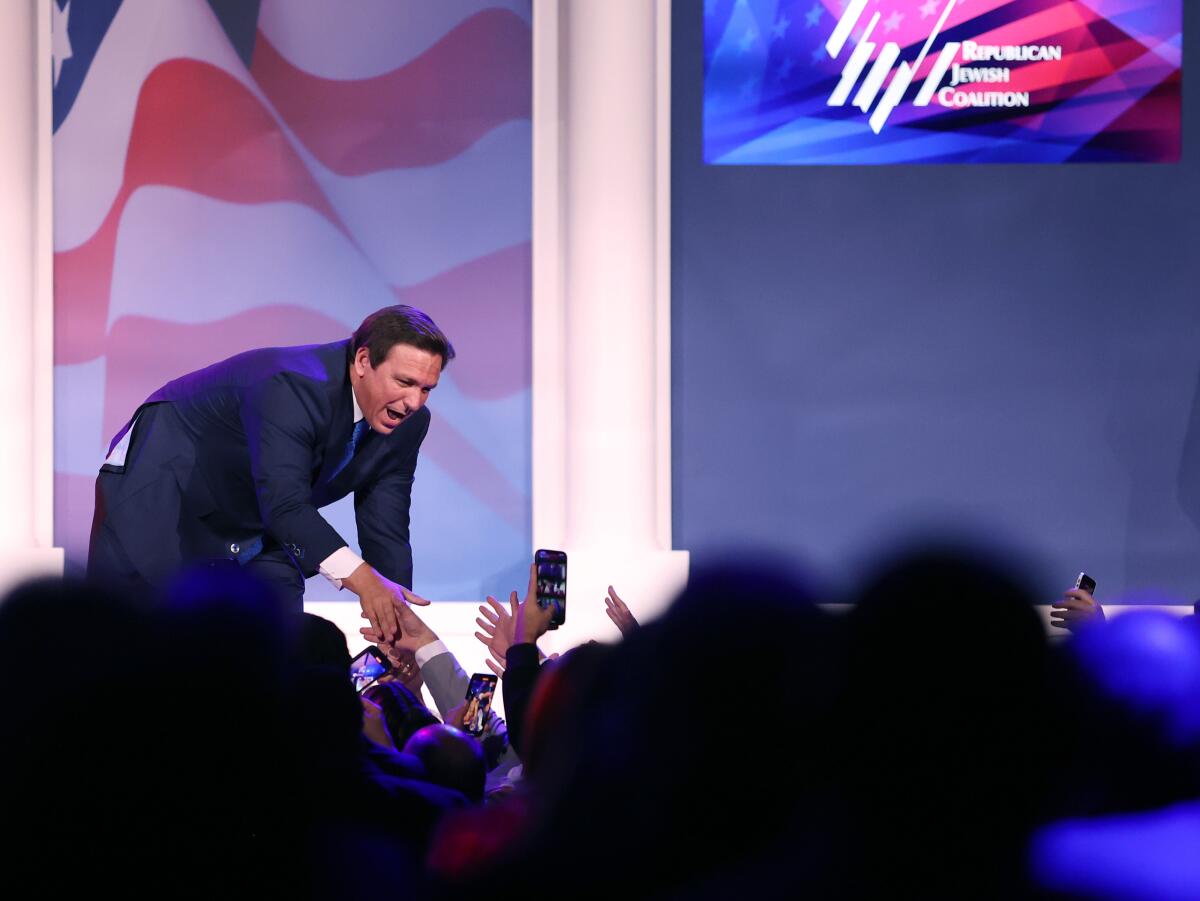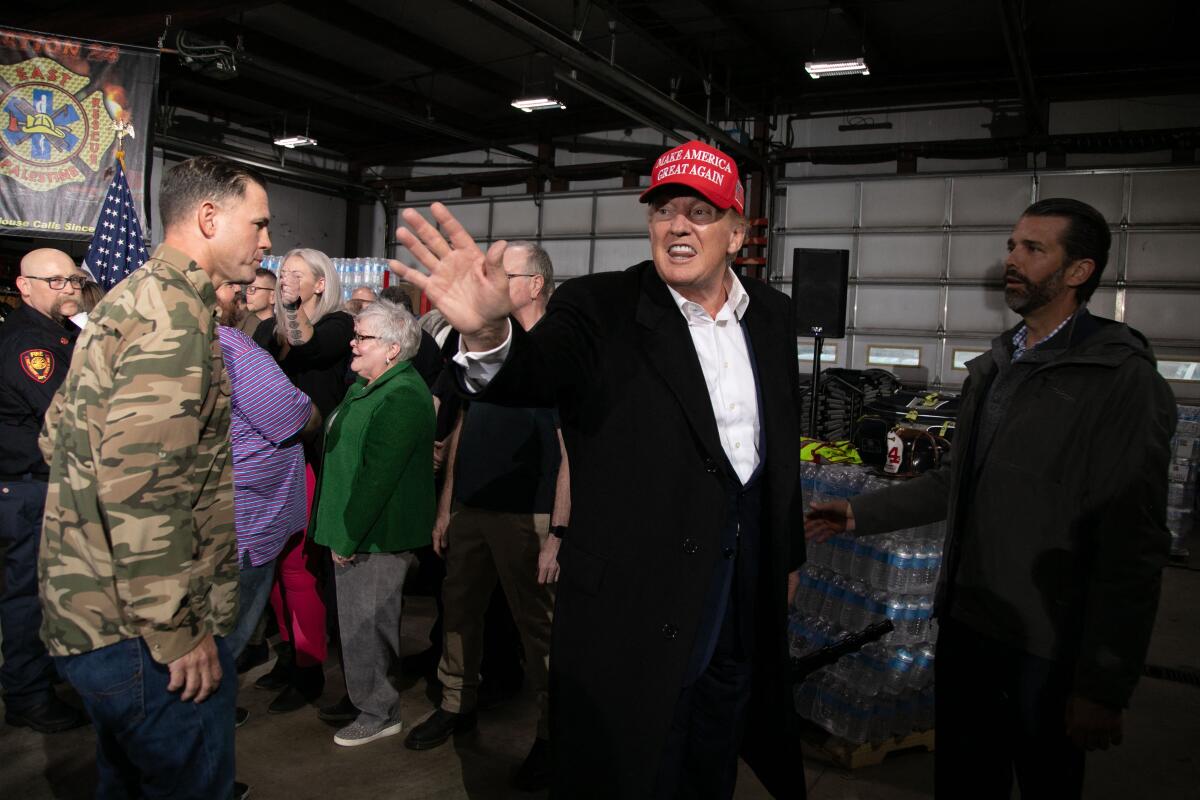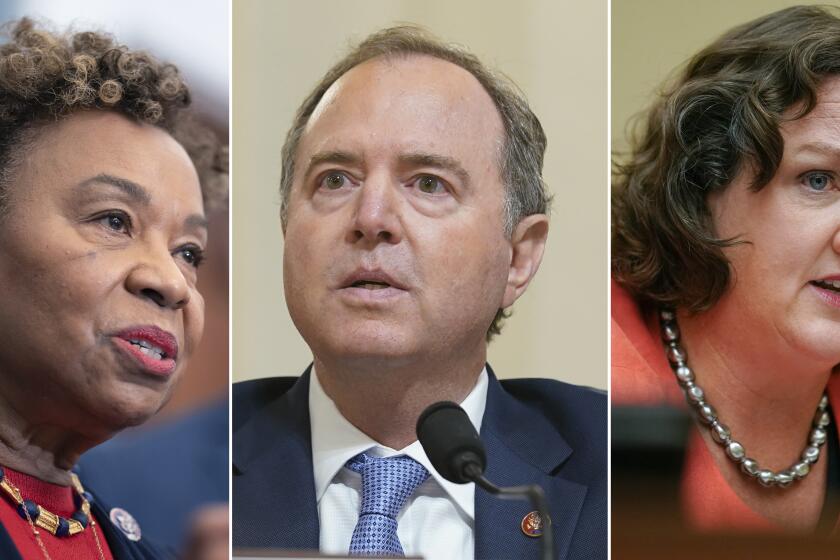DeSantis leads Trump by wide margin in California as primary race starts, poll finds

Florida Gov. Ron DeSantis has surged to a lead among California Republicans over former President Trump for the party’s 2024 presidential nomination, a poll released Friday found.
About 37% of GOP voters backed DeSantis, while 29% preferred Trump, according to the new UC Berkeley Institute of Governmental Studies poll co-sponsored by the Los Angeles Times. These numbers are a near mirror image of the support for the two in an August poll conducted by Berkeley.
Other hopefuls trailed far behind, with none receiving more than 7% in the poll.
California matters to Republican presidential contenders despite its overall Democratic majority. Nearly 2.3 million voters cast ballots for Trump in the state’s March 2020 primary, the most in any state in the nation.
DeSantis has taken a particularly strong lead among Republican voters with a college degree, who back him by more than 2 to 1 over Trump. The former president has the support of Republicans who did not attend college, and the two run close to even among those who have some college experience but not a four-year degree.
Among California Republicans who voted for Trump in 2020, DeSantis leads by 11 points in the new poll; he trailed Trump by 14 points among such voters six months ago.
“There is serious defection among his ranks,” said Mark DiCamillo, director of the IGS poll. “These voters are now on board with DeSantis more than Trump. That’s fairly significant.”
The poll results come just over a week before DeSantis is scheduled to visit Southern California, with speeches in Orange County and at the Ronald Reagan Presidential Library in Simi Valley, spots where he will meet with well-heeled Republican donors and party leaders.
With Sen. Dianne Feinstein having announced that she won’t seek another term, the race to replace her has heated up. Two Southern California Democrats have taken a strong early position for the state’s top-two primary.
The survey also illuminated Californians’ complicated views about President Biden and Vice President Kamala Harris in a state where fellow Democrats outnumber Republicans nearly 2 to 1 among registered voters.
While Biden’s approval ratings improved in recent months, with 57% of the state’s voters now praising his job performance, the same share of voters don’t want the 80-year-old to run for reelection next year.
Nearly 6 in 10 of those surveyed were not enthusiastic about Harris running for the White House if Biden decides not to seek another term, even with her roots in California. Harris grew up in the Bay Area and served as San Francisco’s district attorney, the state’s attorney general and California’s U.S. senator.
“Usually, it’s the case that people in your own area are most positive about you, and people outside of your area learn more about you and eventually get on board. That hasn’t been the case for Kamala,” DiCamillo said. “In fact, looking at … the enthusiasm [voters have for her running] for president, in the Bay Area, it’s less than it is in Los Angeles. That’s telling to me. She’s never had a real strong base of support in the Bay Area, and it’s true the entire two-year period of following her as vice president.”
Regardless of those qualms, barring an unprecedented political shift, California’s 54 electoral votes will easily wind up in Democrats’ column in the November 2024 presidential election. Biden leads DeSantis by 23 points among the state’s voters in a hypothetical match-up and beats Trump by 30 points, according to the poll. In 2020, Biden bested Trump by 29% in California.

The state’s 2024 presidential primary, which will occur next March, could be pivotal in deciding the Republican nomination. California will once again have the largest delegation at the 2024 Republican National Convention in Milwaukee, where the party will officially select its nominee.
In addition, the state is home to an enormous group of wealthy donors. In 2020, Trump and his supporting groups received more than $92 million from California donors, making the state the third-largest home of his financial backers, according to the Center for Responsive Politics. The numbers are significant undercounts because they do not include contributions to political action committees or individual donations under $200.
This is one major reason why prominent Republicans, including former Vice President Mike Pence, former Secretary of State Michael R. Pompeo and former United Nations Ambassador Nikki Haley are among the White House hopefuls who have visited the state since the last presidential election.
Haley recently announced a 2024 presidential bid; Pence, Pompeo and others are believed to be eyeing a bid.
Along with Trump and DeSantis, Pence, Pompeo and Haley were among the 11 Republicans included in the potential presidential field in the Berkeley IGS poll.
DeSantis is scheduled to speak at the Reagan Library as well as at a fundraiser for the Orange County GOP on March 5. While it’s unclear whether he is raising money for committees supporting his electoral efforts, DeSantis will meet and mingle with major GOP donors at the events, which are taking place in citadels of wealthy and well-connected conservatives, according to sources familiar with his plans.
The polling shows why such regions may be essential to the DeSantis campaign if he runs. Republican voters who are more educated and wealthier are far more likely to support the Florida governor over Trump.
GOP college graduates backed DeSantis over Trump 39% to 21% in the poll, while Republicans with a postgraduate education preferred DeSantis over Trump nearly 3 to 1. By contrast, Republican voters with no more than a high school education preferred Trump over DeSantis 45% to 30%.
There were similar disparities among voters with different incomes, with GOP voters in wealthier California households being far more likely to support DeSantis than Trump.
White voters without a college education have long been Trump’s strongest supporters, and his weakness among college-educated voters, which emerged during the 2016 election, helped Democrats win in former conservative bastions such as Orange County that year — the first time the county supported a Democrat for president since the Great Depression. That dynamic was evident in the 2018 midterm elections and the 2020 presidential contest.
It was the home of Richard Nixon, the cradle of Ronald Reagan’s career and, for decades, a virtual synonym for the Republican Party of California.
The poll indicates that the college divide is splitting Republican ranks, echoing other surveys that have shown that division nationally.
That could benefit DeSantis in states such as California, in which college graduates make up a large share of the electorate. But it could boost Trump in other parts of the nation, including parts of the South and the Midwest, where non-college voters dominated Republican primaries.
Voters who stopped their education after high school or didn’t receive their high school degree account for 18% of the Republican electorate in California but made up just over 1 in 3 GOP voters nationwide in 2020, according to the Pew Research Center.
DiCamillo said GOP voters who have a high school degree or didn’t complete it have remained consistent in their support for Trump, which makes sense because they were the foundation of his base.
“But the other segments are moving,” he said. “That’s the vulnerability Trump has this time around … at least in California.”
The Berkeley IGS poll surveyed 7,512 California registered voters online in English and Spanish, including a weighted sample of 1,755 registered Republicans, from Feb. 14 to 20. Because the survey results are weighted to match census and voter registration benchmarks, precise estimates of the margin of error are difficult; however, the results are estimated to have a margin of error of 2 percentage points in either direction for the full sample and 3.5 percentage points for the Republican sample.
More to Read
Get our L.A. Times Politics newsletter
The latest news, analysis and insights from our politics team.
You may occasionally receive promotional content from the Los Angeles Times.












